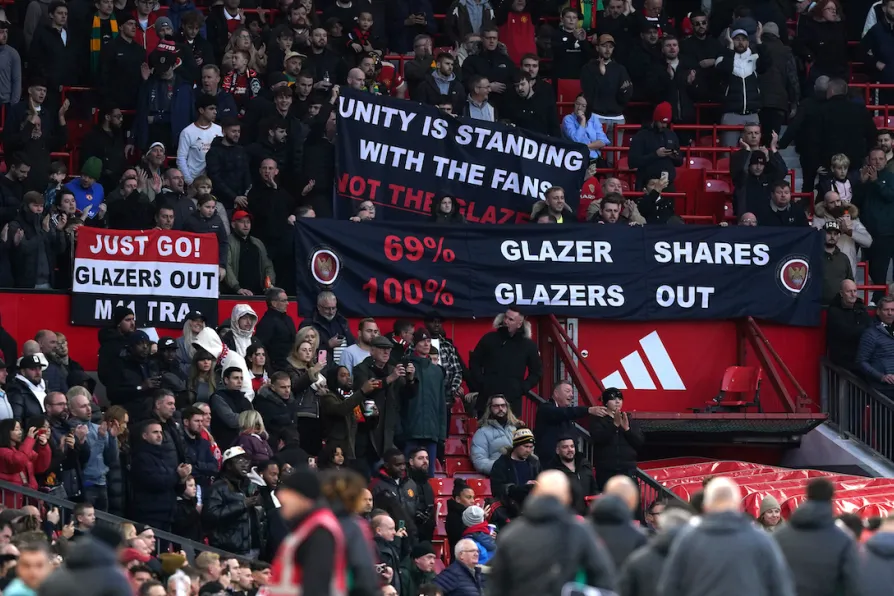
 A view of Manchester United fans protest banners against the Glazer's ownership during the Premier League match at Old Trafford, Manchester. Picture date: Saturday November 11, 2023.
A view of Manchester United fans protest banners against the Glazer's ownership during the Premier League match at Old Trafford, Manchester. Picture date: Saturday November 11, 2023.
AHEAD of Manchester United’s last game before the most recent international break, a pocket of fans gathered outside Old Trafford’s north-west quadrant to protest against the Glazer family’s ownership of the club.
It was, from the protesters’ point of view, a disappointingly small assembly and there were as many people observing, filming, and taking photos as there were actively protesting.
One fan who shuffled uncomfortably past the protest mumbled “they don’t speak for me.”
At this moment in time, the club is in limbo, which perhaps explains the relatively small turnout.
Jim Ratcliffe, the billionaire boss of the lucrative chemicals company Ineos, is expected to buy a minority stake in the club in the coming days or weeks.
Ratcliffe is expected to take charge of football operations, but the Glazers will remain as majority owners, hence continued protests.
Inside the stadium that day, United stumbled to a 1-0 win against newly promoted Premier League underdogs Luton Town.
Luton seemed more comfortable in their own skin at Old Trafford than United. They knew what they were about, performed with a sense of purpose and plan, and could even have got something from the game.
United missed chances, looked ragged, and remain unable to find an identity. But still won.
For all the best efforts of manager Erik Ten Hag, as long as United are in limbo off the pitch, a similar sense of uncertainty permeates onto it.
If United fans think they are going through a rough patch, still in the Champions League and still within reach of the top four despite their issues, then they might have some empathy with Everton fans, whose plight is far worse, when they visit Goodison Park on Sunday.
With this in mind, it’s no surprise United supporters are expected to back Everton’s protests on Sunday against a Premier League points deduction for breaking the league’s profit and sustainability rules.
These clubs have been through similar ownership problems, with no lack of spending but apparently no purpose or plan behind it.
Both clubs have been among the Premier League’s biggest spenders in recent years. Just one year ago they were in the top five for total transfer spend for the previous five years with United second and Everton fifth.
The competency to spend this money wisely has been sorely lacking, although a few of the signings Everton got right, such as Richarlison and Lucas Digne, have been sold to lessen the damage.
Meanwhile, a rare shrewd signing, Jarrad Branthwaite, is helping them on the pitch this season. The centre-back they signed for under a million from Carlisle now looks like one of the most promising English defenders in the league.
United continue to be among the top spenders in English football, second only to Chelsea in the most recent five-year period according to Transfermarkt.
Everton have had to tighten their belts, though, and for the past three seasons have a positive net spend in the transfer market with much-lauded Brighton — who Everton were only five points behind prior to the points deduction — the only other club to do the same during this period.
Everton don’t have the commercial might of United to help them absorb their failures in the transfer market, and this inability to make up the difference led to the recent investigation and subsequent sanctions.
The commission’s report details Everton eventually admitting to breaching the Premier League’s profit and sustainability rules.
Their ownership was so incompetent that it couldn’t even gain a benefit from this rule break, but in the process of punishing the owners, those hardest hit will be the fans.
Maybe the benefit was staying in the Premier League at the expense of the likes of Burnley and Leicester, whose fans will be aggrieved that punishment for such rule breaches doesn’t arrive in real time.
Everton fans themselves have been informing the outside world of the issue with their club’s ownership for some time. Presumably, it fell on deaf ears.
By the time the deduction of 10 points was decided, it felt like a warped way of eventually agreeing with the supporters but then punishing them more than it punishes the owners.
This weekend, Everton supporters will begin their fightback against these sanctions.
Just as they protested against their club’s owners overseeing the decline of the club, they will now protest against what they see as an attempt by the Premier League to see it decline further.
A message will be sent during the high-profile Manchester City versus Liverpool game on Saturday in the form of a plane banner.
Then on Sunday, Goodison Park will be a cauldron of discontent as fans look to protest against the Premier League, before carrying that determination on to support the team.
Everton manager Sean Dyche is very matter of fact about the situation, feeling it unjust but realising that the challenge of improving the team on the pitch has not changed.
There might now be even more of a fighting spirit within the Everton squad, and Dyche said: “If anything, it enhances what we’re doing. It means we’ve got to go harder for longer and play stronger.”
This will certainly be the case in the stands on Saturday when the two dissatisfied worlds of Everton and Manchester United collide.

As the historic ground prepares for its emotional farewell, even visiting teams like Manchester City are paying tribute to one of English football’s most storied stadiums, writes JAMES NALTON













